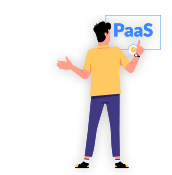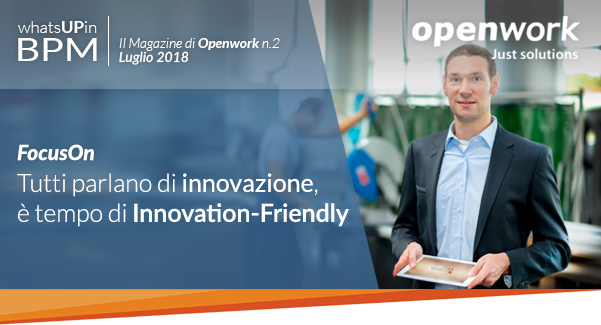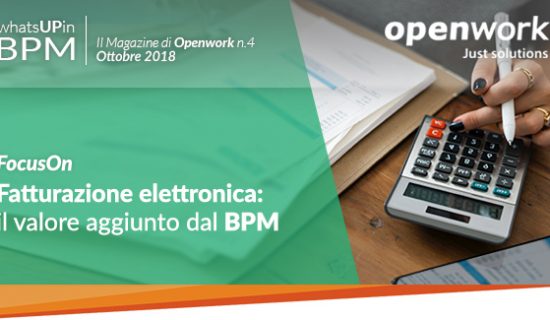Those in the marketplace today cannot overlook the general acceleration in pace that is leading many companies to question how to harness the potential offered by digital to keep the enterprise efficient and always competitive.
The level of digital maturity of enterprises varies widely, yet the risk is always around the corner that investment in digital is reduced to the mere acquisition of tools, neglecting the cultural and organizational transitions that are, instead, of primary importance.
But what is the Digital Transformation Program that is so much talked about?
The term transformation refers to the transition from an AS IS situation to a TO BE situation made possible by the introduction of digital technology, which enables traditional activities to be carried out in a new way; in a single word, to innovate.
The word program suggests that this transition must be planned over time and studied in its organizational impact in order for the full potential of the journey to be realized.
In this program, it is necessary to always take into account the investments already put in place and the organizational impacts of new ones, since to achieve tangible benefits it is necessary to integrate the two assets by enhancing existing systems without disrupting the organization.
This is the reason why in Openwork, for a while now, we have been talking about Innovation-Friendly, the rapid and sustainable digital transformation based on bringing Business Process Management cloud technology into the organization.
How does this approach differ? First and foremost, it does not disrupt the organization of the company but manages to integrate with the existing technological equipment and support the processes carried out by different professional figures, starting with business managers. The Innovation-Friendly approach does not impose itself as a digital revolution, but results in the introduction of technology that complements the existing ERP, enables the management of processes involving business managers, and enhances the individual productivity tools already in use.
In addition, the untraumatic integration into the organization takes into account the most important asset for any company: people, who are not overwhelmed by the new technologies introduced, but continue to operate with familiar tools and methods, integrated into the new and more rational processes. Thanks to this mode of integration, the benefits on the organization can be felt immediately in everyday work, operations management and process control.
This is what has happened to organizations that have chosen the Innovation-Friendly approach of BPM's Jamio openwork cloud platform to address specific needs or particular business phases: this is the case of Cassa Nazionale Forense, Dedalus, Duferco Energia, Ferretti Group, Casillo Group, to name just a few of the latest users.
Keep following us in our Magazine, we will have a chance to cover in detail the link between "customer value" and "friendly approach" to innovation introduced.

Editorial by:
Martin Arborea - Sales & Marketig Director Openwork
OPEN FOR HOLIDAYS: Support on the Jamio platform does not go on vacation

Openwork and Jamio prepare for the sea and the sun by opening for the vacations. Customer Service does not go on vacation and remains operational in August to ensure customers and partners get the support they may need, all the time. Jamio openwork is the platform designed to help you run your business in the most efficient and productive way any time of the year.
"COLLABORATE": here is the platform of a distributed fashion workshop

The BPM enters the fashion world through the "Collaborate" project developed in Ametlab, a clothing production laboratory founded in 2014 that decided to involve other companies in the industry in a new way of thinking about the fashion supply chain.
With an Innovation-Friendly approach, Ametlab is reorganizing its processes to improve the management of orders, structure the organization of the network of laboratories adhering to the project, regulate warehouse logistics, and channel all actors, including suppliers and customers, onto a single web platform to better manage order flows. The ambition of the project does not end here: in fact, a second phase has already been devised that will cover the processes of style consultancy and the creation of digital models and prototypes, which will also be channelled onto the platform to ensure secure, simple and innovative management.
The numerous operational steps related to the operational flow fromcustomer order analysis, requirement determination, assignment of the order to suppliers, industrial production of the garments and order closing, constitute the solution realized on the BPM platform enabling innovative process management. In fact, the solution, realized on the Jamio openwork platform, enables specific needs to be met:
- Facilitate collaboration among all participating fashion supply chain players to increase business volume and limit periods of low production;
- Engineering and optimizing production and business planning processes;
- Simplify and speed up the manufacturing product buying and selling processes.
The entire operational flow and the actors involved: collaborators, suppliers, professionalism, procurement procedures and production finds on the cloud platform the ideal place to be optimized and hosted entirely, starting with the receipt of the order and ending with the closing of the order.
An innovative solution for the challenging idea on which the fashion network promoted by Ametlab is based: on a single platform all the information related to the production path becomes immediately available, with the possibility to maintain control of the timing, ensure an optimal division of tasks, workloads and rules of engagement. It also makes it possible to measure the performance of the network capable of competitively proposing itself in the marketplace.
A "modulable and re-modulable enterprise" that was first made possible thanks to visionary entrepreneurial insight and the reliability and ductility of the Jamio platform.
That IT Governance Problem Called PEC

Larger, structured organizations have long since realized that PEC management cannot be approached in an "amateur" way by relying on Webmail and standard e-mail clients.
The reason lies in the peculiarity of conversations entrusted to PEC. Informal email interlocutions usually present low risks related to loss of information, partly because there is always at least one of the interlocutors who has an interest in soliciting a response. Formal ones via PEC, on the other hand, sometimes contain information of a peremptory nature that, in the event of failure to respond and/or failure to activate appropriate management procedures, can lead to even significant financial damage to the organization.
Ultimately, if one can "afford" to not follow up on an email, one may not necessarily "afford" to not follow up on a PEC.
The use of webmail and/or mail clients is not useful, therefore, to ensure the optimal management of PEC and exposes organizations to non-negligible operational risks: this is why public and private realities are increasingly looking for professional solutions, possibly "Enterprise" class, to manage the problem.
Several vertical solutions are available on the market, some of which are, in practice, dedicated clients that are more evolved than standard ones designed specifically to manage PEC messages.
Different is however the application approach that can be achieved with a Business Process Management cloud platform. A choice that translates into obvious advantages for users that we want to explain to you.
Behind a PEC message there is a complex organizational process, the management of information and document flows, the components of an organization involved in a job, and the possibility of having to integrate other systems: aspects that a BPM platform can effectively address by reducing the operational and economic risks associated with inappropriate use of PEC.
By orchestrating these services through BPM, it is possible to separate the organization from the PEC boxes, which is critical in larger organizations. Indeed, in the presence of dozens or hundreds of operators and multiple boxes to manage, it is possible to implement solutions that can solve this IT Governance problem and overcome all the limitations that traditional PEC management systems fail to address:

- Limited box space;
- Data dispersion between PCs and operators;
- No centralized management of sorting;
- No controlled management of time and deadlines;
- Presidium of IT complicated;
- Mass mailing impractical;
- Unchecked message intake;
- Difficult reconnaissance of receipts.
Since this is an all-Italian issue, there are very few BPM platforms that have dedicated services for the management of mailboxes and pec messages, such that such solutions can be implemented, one among them being Jamio Openwork.
Openwork, by introducing such services dedicated to the management of PEC mailboxes and messages into its platform, has solved all these problems, enabling solutions that allow:

- A very quick activation thanks to the power of the cloud and the high configurability of the standard solution;
- Of simplifying IT governance;
- The reduction of operational and economic risks;
- Of introducing a platform that can be "leveraged" both vertically to make the solution increasingly customized to specific needs (thanks to the availability of Jamio openwork in source format), and horizontally to develop many other BPM solutions on the same platform.
This is why numerous public and private entities have already adopted BPM's Jamio openwork platform for PEC management while others are doing so once they have verified our solution's responsiveness to specific organizational needs and its cost-effectiveness compared to other vertical solutions.
Openwork and Bari Polytechnic University together for a Competence Center on Business Process Management

There are many organizations that manage their activities in a non-integrated manner and with little attention to processes in their entirety. And this can have negative impacts on performance.
With the intention of bringing the world of organizations closer to the "process" culture, Openwork and the Polytechnic University of Bari have established a specialized center that studies and disseminates knowledge on ways to improve business processes, putting forward sustainable solutions in social, environmental and economic terms. It is the Business Process Management (BPM) Competence Center, which, in addition to spreading knowledge about processes and BPM throughout the territory, aims to create professional figures specialized in these issues, in a virtuous example of collaboration between the business and academic worlds.
Therefore, project work, internships and theses conducted in companies on these topics constitute a formidable opportunity for technology transfer in both directions, to and from the university. It is, in fact, a great opportunity for students who learn to apply the theoretical concepts learned in the course of their studies and have the opportunity to engage with the realities operating in the area. A great opportunity for the public and private organizations that host the students and that, thanks to direct experimentation, have a way to understand the enormous potential that the adoption of a vision for processes can bring.
Finally, this is a great opportunity for teachers, who in this way can engage with the local business fabric and activate processes of mutual growth: by putting the academic vision alongside the business one, it becomes easier to create professional figures who are prepared and ready to enter the world of work.
In addition, the Center of Expertise promotes research activities, particularly delving into three topics:
- BPM reachness, i.e., BPM methods and solutions capable of serving no longer just single, well-defined organizations, but networks of organizations and people with labile and changing boundaries, adapting and integrating, depending on the context and in an agile manner, with solutions already used by members of the networks;
- BPM richness, i.e., methods and solutions that can complement the traditional problem-driven approach, typical of BPM, with the opportunity-driven one, related to the exploration of new opportunities and innovative process management, so as to transform opportunities and visions into new processes. This is what can happen by delving into the areas of social media, big data, Industry 4.0 topics, Internet of Things or Sustainable Business Process Management;
- Case Management, i.e., methods and solutions for managing knowledge and coordination intensive processes that develop in an unpredictable environment.
An ambitious and innovative project that has become a reality thanks to the invaluable contribution of Openwork and Bari Polytechnic faculty.
Barbara Scozzi
Associate Prof. Politecnico di Bari and Head of BPM Competence Center.
DO YOU FIND THE TOPICS INTERESTING? RECEIVE THEM BY EMAIL
Subscribe to "WhatsUp in BPM," the Openwork Magazine








